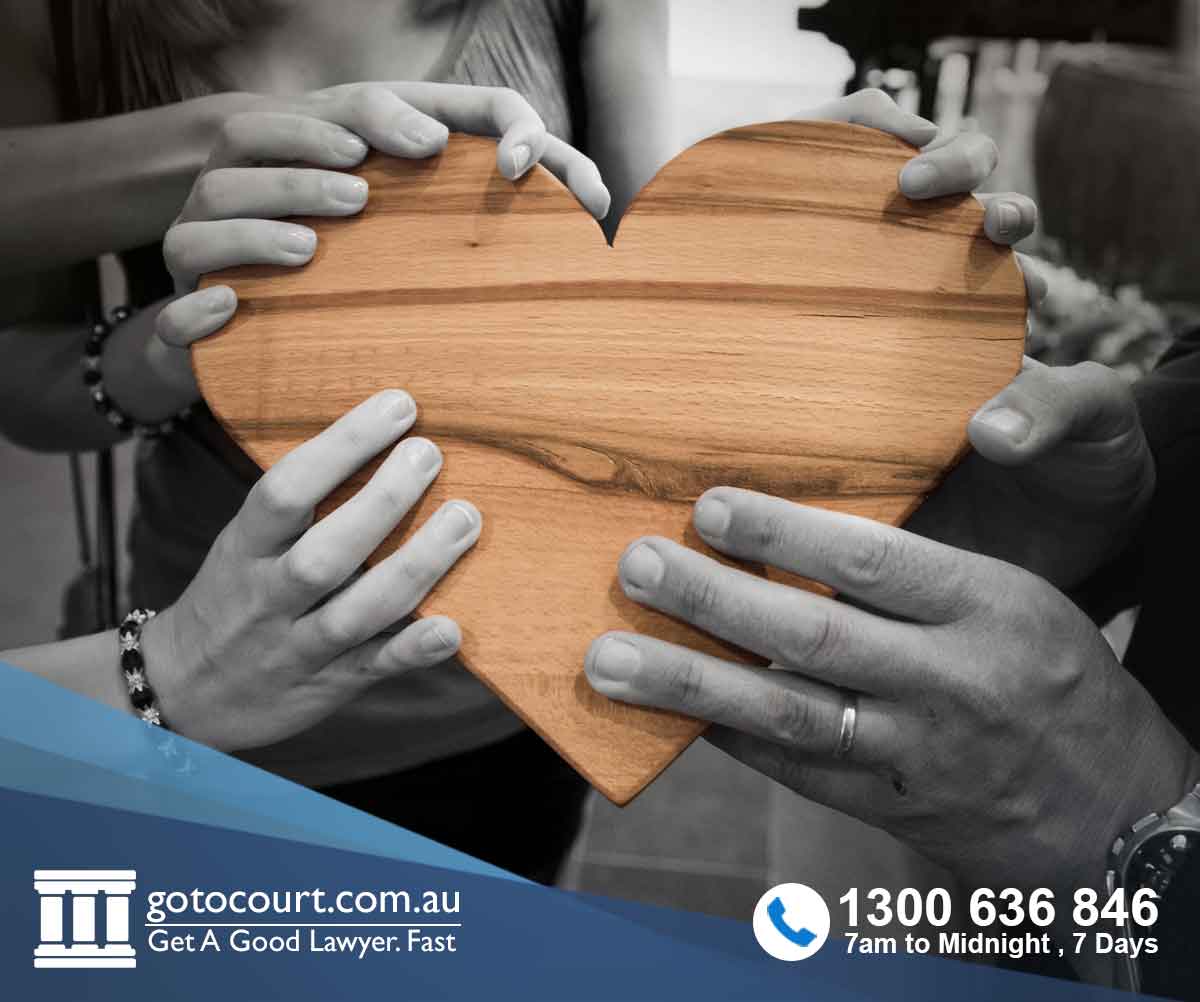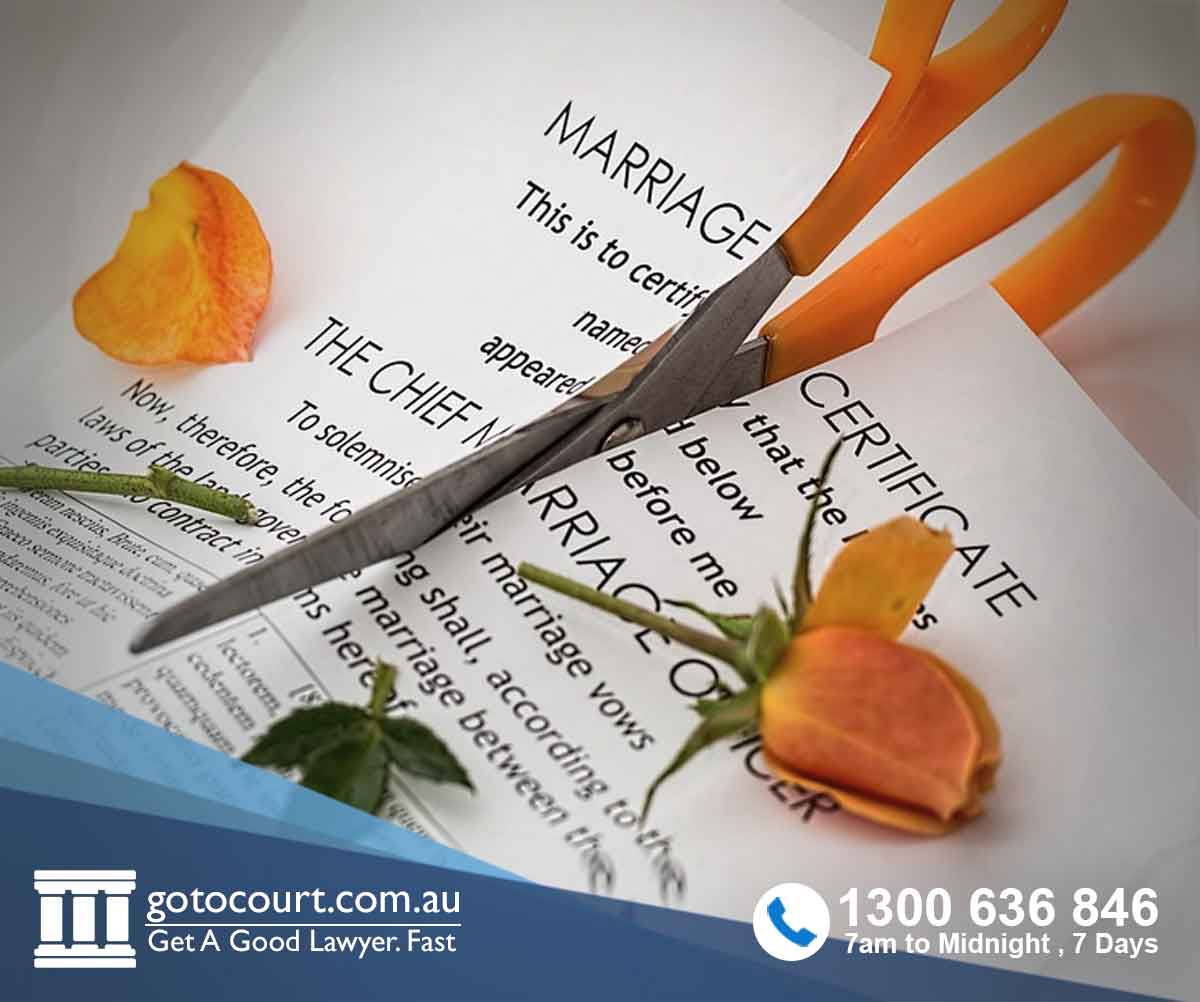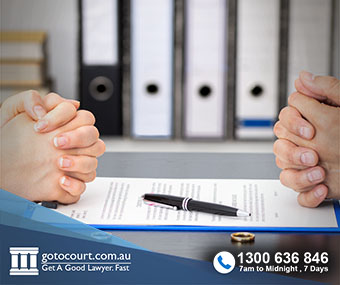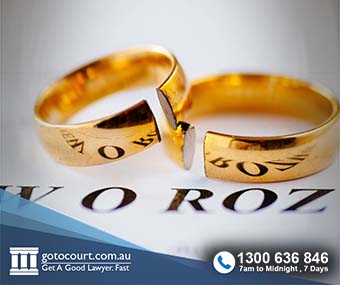Call our lawyers
now
or,
have our lawyers
call you
Divorce Requirements
Updated on Dec 28, 2022 • 6 min read • 713 views • Copy Link
Divorce Requirements
Divorce is essentially the legal dissolution or ending of a marriage, and it has the same process in all states and territories of Australia. The appropriate court in which to file for divorce is the Federal Circuit and Family Court of Australia (FCFCA), which handles all divorces in Australia under the governance of Part VI of the Family Law Act 1975.
Can I apply for a divorce myself, or do I need a lawyer?
You may put together your own divorce application, or alternatively, you can ask a lawyer to do it for you. However, it’s strongly recommended in any case that you seek legal advice before you make the application. This is especially the case when you have children or hold joint property together with your partner.
The no-fault principle is one of the divorce requirements
Divorce in Australia is governed by the no-fault principle. This means that the court doesn’t need to decide who might be at ‘fault’ for the marriage breakdown when it considers your divorce application, nor does the court even need to know any reasons for the marriage breakdown. The no-fault principle was established as one of the divorce requirements by the Family Law Act 1975.
Irretrievable breakdown requirement
In fact, the only legal ground or justification that’s required by the Family Law Act 1975 for your divorce application is that the marriage has irretrievably broken down, which constitutes another one of the divorce requirements in Australia. The court will regard this irretrievable breakdown requirement as being satisfied if you’ve been legally separated from your partner for at least 12 months, with no reasonable prospect of getting back together.
Legally recognised marriage
A further component of the divorce requirements is that your marriage must be legally recognised in Australia before the Court will have the jurisdiction or authority to grant your divorce application. While this is fairly simple to demonstrate when your marriage took place in Australia, it’s more complicated when your marriage occurred overseas, which will require additional evidence and steps. In any case, you’ll require a copy of the marriage certificate for your divorce application, though it doesn’t need to be an original, affirmed or certified copy.
Australian citizenship or residency requirements
In addition to your marriage being legally recognised in Australia, an additional component of the divorce requirements is that you or your partner must either have Australian citizenship or alternatively satisfy at least one of certain Australian residency requirements. One of these residency requirements is that you or your partner must have lived in Australia on a continual basis for at least 12 months prior to the application.
Determining whether you or your partner have Australian citizenship
The court will have the jurisdiction or authority to grant your divorce application if either you or your partner are an Australian citizen, whether by birth, descent or naturalization. If you weren’t born in Australia, you may need to provide proof of your citizenship, such as your passport.
Residency requirements if neither you nor your partner have Australian citizenship
If neither you nor your partner have Australian citizenship, the court may still have jurisdiction to grant your application, provided that either you or your partner satisfy at least one of various residency requirements. One of these residency requirements can be satisfied when either you or your partner is a lawful resident of Australia. Another requirement can be satisfied when either you or your partner have lived continually in Australia for at least 12 months prior to the divorce application. A further requirement can be satisfied when either you or your partner regard Australia as your permanent home and intend to live in Australia indefinitely.
What if my marriage took place overseas?
While an overseas marriage can’t actually be registered in Australia, the foreign marriage certificate will nevertheless constitute evidence that this marriage took place. When you file for divorce in these circumstances, you’ll need to get the overseas marriage certificate translated into English by a registered translator. You’ll then need to attach both the marriage certificate and its translation to an affidavit, which is a written statement that will be presented as evidence to the court.
When will an overseas marriage be recognised in Australia?
Generally speaking, an overseas marriage will be recognised in Australia if it’s recognised as legally valid in the country where the marriage occurred. That said, there’s also the requirement that the marriage would have been recognised as valid under Australian law had it occurred in Australia.
When won’t an overseas marriage be recognised in Australia?
If either you or your partner were validly married to another person at the time of the overseas marriage in question, then that overseas marriage won’t be recognised in Australia. In addition, an overseas marriage won’t be recognised if either you or your partner weren’t of marriageable age under Australian law. Another scenario is when you and your partner in the overseas marriage were too closely related in a biological sense, such that one of you was an ancestor, descendant or sibling of the other. A further scenario is when real consent to the overseas marriage can’t be considered to have been given, due to fraud, duress, mistaken identity, mental incapacity or lack of understanding.
Counselling certificate required when you’ve been married less than two years
In the event that you’ve been married to your partner for less than two years, then you’ll also need to provide a counselling certificate when you file for divorce. In order to obtain a counselling certificate in these circumstances, you’ll need to have attended counselling with your partner prior to making the application. Furthermore, during the course of this counselling, you’ll need to have considered the possibility of reconciliation, which essentially means you’ll need to have discussed the possibility of getting back together.
What if I’m separated from my partner, but we’ve still been living under the same roof?
One possible scenario when making a divorce application is where you’re separated from your partner, but you’ve still been living in the same residence, for any portion of the twelve months prior to the filing of your application. In this scenario, the court will require extra evidence from you in the form of an affidavit. In the case of a joint application, both you and your partner should file such an affidavit.
Third party affidavit required when you’ve been separated but still living under the same roof
In the scenario where you’re separated from your partner but you’ve still been living in the same residence for any part of the prior twelve months, you’ll need to ask a third person to file an affidavit. The third person’s affidavit will be for the purpose of corroborating or supporting your own affidavit. You’ll need this third party affidavit whether you file for divorce as a sole applicant or make a joint application with your partner.

Affordable Lawyers
Our Go To Court Lawyers will assist you in all areas of law. We specialise in providing legal advice urgently – at the time when you need it most. If you need a lawyer right now, today, we can help you – no matter where you are in Australia.How It Works







1. You speak directly to a lawyer
When you call the Go To Court Legal Hotline, you will be connected directly to a lawyer, every time.


2. Get your legal situation assessed
We determine the best way forward in your legal matter, free of charge. If you want to go ahead and book a face-to-face appointment, we will connect you with a specialist in your local area.


3. We arrange everything as needed
If you want to go ahead and book a fact-to-face appointment, we will connect you with a specialist in your local area no matter where you are and even at very short notice.

















